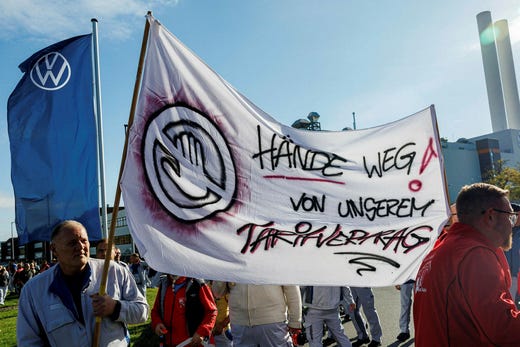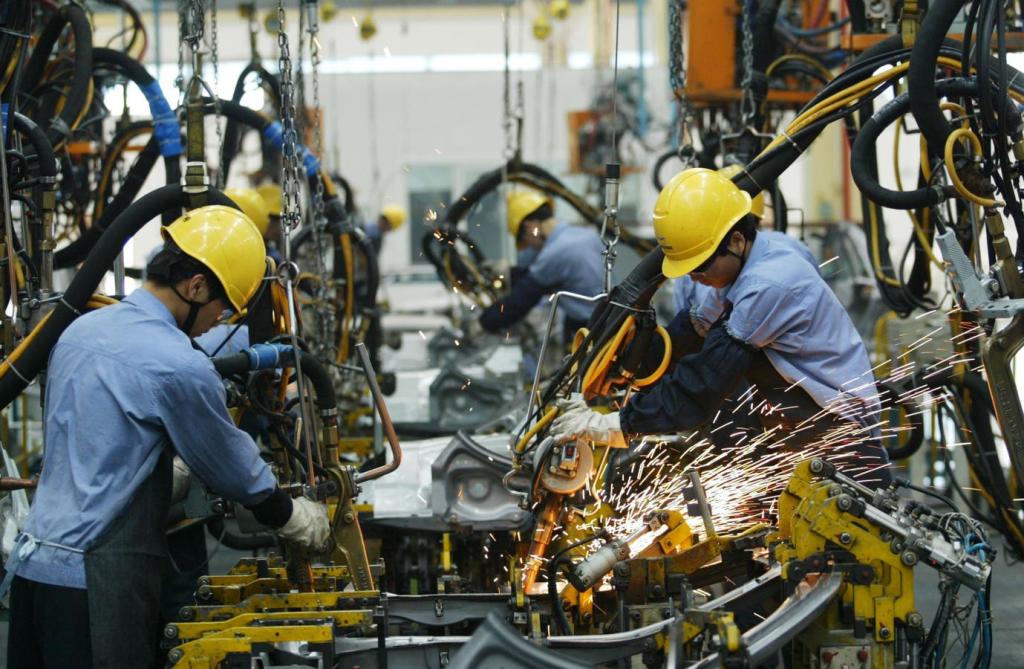Volkswagen's Tough Choices Impacting Workforce and Future
Volkswagen faces significant workforce cuts and factory closures, challenging its future while seeking innovative strategies to adapt and thrive in a changing market.

Key Points
- Volkswagen
plans to close at least three factories in Germany, potentially laying off tens of thousands of workers amid declining vehicle sales.
- The company's historical commitment to job security is being challenged as it prioritizes cost-cutting measures to remain competitive.
- Collaboration between management and unions is essential to navigate these changes and find sustainable solutions for the workforce's future.
Volkswagen, the largest car manufacturer in Europe and a staple of German industry, is currently navigating turbulent waters as it confronts the reality of job cuts and pay reductions that threaten the stability of its workforce. Recent announcements have sent shockwaves through the company and its communities, raising significant concerns over what the future holds for both employees and the automotive sector as a whole.
As reported, Volkswagen is considering shutting down at least three factories in Germany, laying off tens of thousands of workers, and reducing wages by 10%. This decision follows a deeper-than-expected decline in vehicle sales and a sluggish expansion into the electric vehicle (EV) market, areas essential for the company’s competitiveness in a rapidly evolving industry. The pressure from competition, particularly from Chinese manufacturers, escalates the urgency for Volkswagen to restructure its operations and cut costs.

The Economic Impact on the German Workforce
The implications of Volkswagen's proposals are staggering, putting immense pressure not only on its employees but on the broader German economy. Over 120,000 individuals are employed by Volkswagen in Germany, with many relying on their positions for their livelihoods. The potential closure of these factories signifies more than just job losses; it threatens to destabilize entire communities built around these manufacturing hubs.
Workers' representatives have expressed outrage at the announcements, with union leaders asserting that the drastic measures being proposed are unacceptable. For example,
, the head of the Works Council, emphasized that “None of the German VW plants are safe”, which solidifies the disquiet among employees as they brace for a future filled with uncertainty.
A Cultural Shift and Historical Legacy
This situation also encapsulates a significant cultural shift for a company traditionally viewed as a bastion of stability and progress. Volkswagen has long been regarded as a national icon in Germany, not merely a car manufacturer. The company’s historical commitment to safeguarding jobs and maintaining a robust workforce has come under scrutiny as it contemplates measures it once vowed to avoid.
The move to amend its longstanding employment security agreement marks a critical turning point for Volkswagen. As the automaker faces economic headwinds, including a dip in demand and static production levels, it appears to prioritize profitability over its historical promises to employees. For instance, VW’s German factories reportedly carry significantly higher labor costs compared to their counterparts, pushing executives to explore drastic cuts.
Looking Ahead: Finding Solutions and Encouraging Future Growth
While the challenges presented may seem daunting, there remains room for optimism. This critical juncture could lead to a proactive approach, facilitating a strategic shift toward innovation and adaptation within the automotive industry. The ongoing negotiations between the management and unions could yield creative solutions that not only protect jobs but also reposition Volkswagen as a leader in sustainable vehicle production.
The German government is urged to intervene, creating support mechanisms that help ease the transition for workers affected by these cuts. Engaging in transparent dialogue with Volkswagen management might create pathways for collaboration, ensuring that the workforce's concerns are front and center in strategic planning.
Embracing Change for a Sustainable Future
Ultimately, Volkswagen’s predicament is not isolated; it reflects broader challenges affecting the manufacturing sector across Europe. However, embracing change—through investment in new technologies and employee retraining programs—can pave the way for recovery and growth.
As Volkswagen grapples with these tough decisions, the focus must remain on building a sustainable future that honors its workforce while adapting to the changing market landscape. By fostering resilience and encouraging innovative solutions, the company can emerge from this transitional period stronger than before.
The road ahead may be fraught with challenges, but there is potential for Volkswagen to not only preserve its legacy but also to redefine it in a rapidly evolving automotive world. The commitment to finding solutions that benefit both the company and its employees could very well shape the narrative of this historic brand for years to come.


